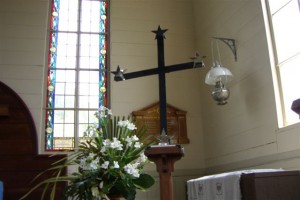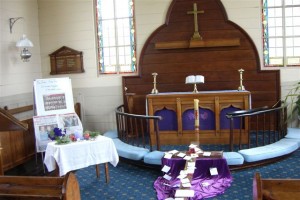Lord, bless me with the clarity of vision to discern your will for me and the courage of heart to carry it out. Amen
I knew what was right from wrong as an 8-year-old in Miss Petheram’s class. I knew that taking a bite out of Peter James’ Pixie Caramel was wrong, but I did it anyway.

The rest of the class apart from Raima and me had gone outside for gym, accompanied by the teacher. I had a gash on my shin so sport was out for me. I don’t know what Raima’s excuse was. We were alone in the classroom.
Suddenly she spied the chocolate bar on Peter’s desk. Immediately she ripped the paper off it and took a bite.
“Have a bite!”
She passed the irresistible morsel to me. I hesitated, fleetingly thought about the consequences and bit. Oh! The delectable taste of it, the powerful wickedness!
On returning to the classroom, Peter’s hand flew up, Miss Pet heram! Someone’s taken a bite out of my Pixie Caramel!
Stand up Raima and Adele! We stood. My legs were collapsing under me with terror.
“Raima, did you take a bite out of Peter’s Pixie Caramel?”
“No, Miss Petheram.”
I was amazed – had Miss Petheram asked me first, she would have received a full confession.
“Adele, did you take a bite out of Peter’s Pixie Caramel?”
“No, Miss Petheram.”
“Sit down, please.”
She believed us! How amazing was that? How comforting. The relief was incredible to describe.
This was to be a turning point in my life.
That night I crept into my bed. I was not alone. My bed-fellow was guilt.
I never confessed to my misdemeanour and even as an adult the sin surfaced from time to time when I read about Peter in the paper, or one of my children offered to share a Pixie Caramel with me.
Twenty-five years later I attended the Highland Intermediate School reunion, of which I was a foundation pupil. I scanned the crowd.
He was there! Peter was in a group.
I couldn’t wait. I didn’t care that someone was talking.
I announced, “Peter James, I have a confession to make to you! I took a bite out of your Pixie Caramel in Standard 3. Miss Petheram’s class?”
He looked bemused, didn’t remember the incident, didn’t remember me but graciously accepted my breathless plea for forgiveness.
Lighthearted it may have been, his companions laughed, and we all entered into the spirit of togetherness that morning, but I left that group feeling elated beyond measure. I felt cleansed and incredibly joyful.
The burden of deceit, I have learned since, can be erased by living in intimate contact with Christ, the source of all joy. By believing and obeying the word of God we are made aware of our wrongdoing which motivates us to confess, renewing our relationship with Christ.
As Christians, we’re expected to reveal Christ’s character to the rest of the community. Jesus asked his disciples to be united in harmony and love.
We in this church have recently had difficult decisions to make about a number of issues. All of us are encouraged to have our say in Christ Church, resulting in differing opinions requiring patience and the ability to acquiesce to another’s point of view. The Holy Spirit is striving to work among us.
All of us need to remember the one most important factor is to ask Him for His opinion first. He WILL guide us, but we MUST be prepared to listen.
As individuals many here have extraordinary strengths. Together, with God’s special care and protection, we will see successful outcomes when defeat seems certain.
We, as Christians can know unity among ourselves if we are living in union with God.
The truth is no-one has ever lived a life completely free from uncertainty, stress and hardship. The Bible makes this clear. Jesus, Moses, Peter, Paul and all the heroes of Scripture are portrayed as men who underwent trying times of pain and heartache.
Now, two thousand years later, we in this congregation, are still undergoing testing times.
If we put ourselves under God’s authority, He will be faithful to resolve our difficulties in His time. We may want Him to act sooner, but only He knows the perfect time to accomplish His purposes. God answers prayer in one of three ways: ‘yes’, ‘no’, or ‘yes, but not yet’.
This last reply seems to be the most dreaded – sometimes even more than an outright ‘no’. Even if we can force our way by manipulating circumstances, we will not be happy with the outcome. We have contentment only when we access God’s will at the very moment.
When God says ‘no’, He is helping us to keep our focus on Him. We must not be resentful or depressed by these moments but recognise them as our Father calling us back to Him. When we grasp that God is in control we will stop questioning His ability to work on our behalf and when we truly believe nothing is too great for Him to handle we will no longer doubt His plan for us is the best one – even if it comes in some other way than what we would choose.
The fact is, disappointment is usually a doorway to greater blessing. God has promised to bring good out of the difficulties we encounter.
The church is not a PLACE where people gather. It is the PEOPLE who gather. To have a Church we must gather.
It’s like the bread we use for the Eucharist. Hundreds of grains of wheat must be gathered to make it. In a similar way, only by gathering do we make Jesus visible to others who don’t know Him. Jesus said to his disciples: “Proclaim the gospel to every creature.”
Composer, Giacomo Puccini, was stricken by cancer while working on his last opera ‘Turandot’. He said to his students: “If I die, finish it for me.”
Shortly afterwards, he died. His students carried out his wish. In 1926 Puccini’s favourite student, Arturo Toscanini, directed the premiere in Milan.
When the opera reached the point where Puccini was forced to put down his pen, Toscanini stopped the music, turned to the audience and said: “Thus far the Master wrote, but he died.”
A reverent silence filled the opera house.
Toscanini picked up the baton again, smiled through his tears, and cried out: “But the disciples finished his work.”
At the end of the opera, the audience broke into tumultuous applause.
Ask yourself: “How prepared and willing am I to help finish my Master’s work?
— Adele Jones, 24 May 2009





